
What Coding Language is Best for Cybersecurity?
We are currently experiencing an era of unprecedented connectivity and convenience, and it has exposed individuals and organizations to significant cybersecurity threats. Protecting sensitive information and critical systems requires not only advanced tools and strategies but also skilled professionals capable of understanding and mitigating these threats. One of the most critical skills for a cybersecurity expert is coding.
But what coding language is best for cybersecurity? The truth is, there’s no one-size-fits-all answer. The best language depends on your specific cybersecurity role and goals.
This article will show you why programming is essential for cybersecurity, it also explores the most impactful programming languages and offers actionable advice for those starting their journey in this field. Whether you’re aspiring to be an ethical hacker, a penetration tester, or a defender in the trenches of cyber warfare, mastering coding is an essential step.

Start a Life-Changing Career in Cybersecurity Today
The Importance of Programming in Cybersecurity
The importance of programming in cybersecurity cannot be overstated, Cybersecurity professionals must understand coding if they want to stay ahead of the threats.
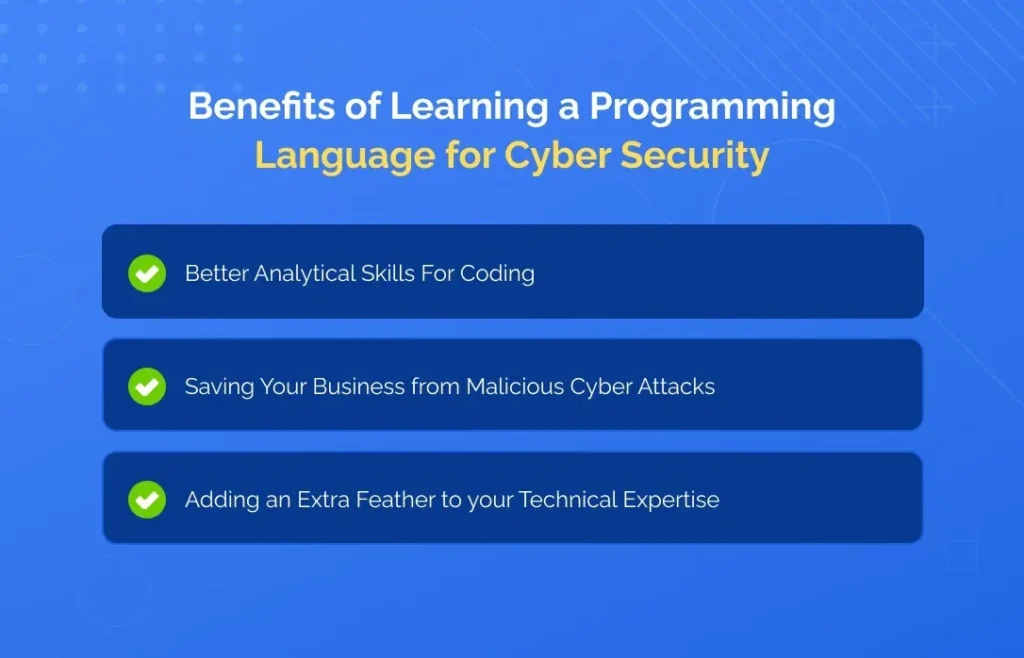
Do I Need to Learn Programming for Cybersecurity?
If you want to excel in cybersecurity, understanding programming is not just helpful—it’s essential. While it’s possible to work in certain cybersecurity roles without in-depth coding knowledge, being able to read, write, and analyze code will enhance your effectiveness.
Programming allows you to:
- Analyze and dissect malicious code: Whether you’re identifying malware or reverse-engineering an exploit, understanding how the code works is crucial.
- Automate repetitive tasks: Writing scripts can save time during vulnerability assessments, penetration testing, and incident response.
- Develop and modify tools: Many cybersecurity tools are open-source, but modifying them to suit specific needs requires coding knowledge.
- Understand the systems you protect: From web applications to databases and operating systems, knowing how they’re built allows you to better defend them.
How Programming Powers Cybersecurity Roles
Programming plays a role in both offensive and defensive cybersecurity tasks:
- Offensive Roles (Red Team, Ethical Hacking): Hackers use programming to exploit vulnerabilities, develop malware, and perform penetration tests.
- Defensive Roles (Blue Team, Security Analysis): Defensive professionals leverage coding to write detection algorithms, automate responses to attacks, and analyze logs.
Cybersecurity Coding Examples
Here are a few real-world scenarios where programming is applied in cybersecurity:
- Python: Writing a script to analyze logs for unusual patterns that might indicate a breach.
- Bash or PowerShell: Automating file integrity monitoring to detect tampering.
- SQL: Performing queries to detect unauthorized database access.
- C or C++: Developing a rootkit for red-teaming exercises or creating low-level security software.
The ability to code empowers cybersecurity professionals to stay ahead of threats and adapt to the ever-changing landscape of digital security.
READ MORE LIKE THIS: What Coding Language Should I Learn for Cyber Security?
The Best Programming Languages for Cybersecurity
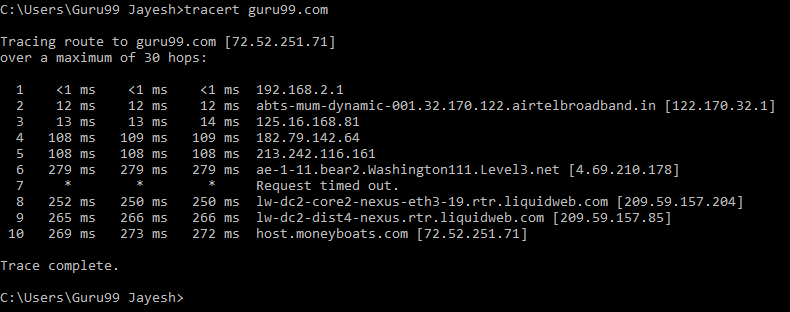
The question of what coding language is best for cybersecurity is subjective and depends on your goals, such as the types of systems you want to protect or the specific role you aim to pursue.
What coding language is best for cybersecurity?
Here’s a detailed look at the top programming languages for cybersecurity:
1. Python: The All-Rounder
Python continues to dominate in cybersecurity due to its simplicity and versatility.
- Why It’s Great: Python is easy to learn, making it a favorite for beginners and professionals alike. Its vast library ecosystem supports everything from data analysis to network scanning and penetration testing.
- Cybersecurity Applications: Writing exploits, automating tasks, creating scripts for penetration tests, and analyzing malware.
- Cybersecurity Coding Example: Using libraries like Scapy to analyze network traffic or PyCrypto for cryptographic tasks.
- Community Support: Python boasts a massive community, ensuring ample resources, tutorials, and third-party plugins.
2. JavaScript: The Web Defender and Offender
JavaScript is indispensable for web-related cybersecurity tasks.
- Why It’s Great: Since most web applications rely on JavaScript, understanding it helps in identifying and fixing vulnerabilities.
- Cybersecurity Applications: Detecting and exploiting cross-site scripting (XSS) vulnerabilities, crafting malicious payloads, and backend exploitation with Node.js.
- Cybersecurity Coding Example: Writing scripts to test for XSS vulnerabilities or spoofing user interactions on a website.
- Community Insights: Popular discussions on programming languages for cybersecurity Reddit threads frequently highlight JavaScript’s critical role in web security.
3. C and C++: The Low-Level Guardians
For those working on systems security or malware analysis, C and C++ are the essential coding language for you.
- Why They’re Great: These languages allow for deep interaction with hardware and operating systems.
- Cybersecurity Applications: Writing rootkits, reverse engineering, analyzing system-level vulnerabilities, and developing custom exploits.
- Cybersecurity Coding Example: Creating shellcode or debugging vulnerabilities in software.
- Advanced Use: Professionals seeking high-performance tools or low-level security mechanisms prioritize these languages.
4. SQL: The Database Specialist
SQL is the backbone of database management and manipulation.
- Why It’s Great: SQL injection is one of the most common web vulnerabilities, making SQL knowledge indispensable for identifying and preventing such attacks.
- Cybersecurity Applications: Detecting SQL injection vulnerabilities, database forensics, and securing sensitive information in relational databases.
- Cybersecurity Coding Example: Writing queries to audit database access logs or test for malicious inputs.
- In-Demand Skill: Expertise in SQL is often mentioned in job requirements, reflecting its importance in the cybersecurity coding salary spectrum.
5. Java: The Versatile Veteran
Java remains relevant in cybersecurity, especially for enterprise-level applications.
- Why It’s Great: Many legacy systems and enterprise software use Java, making it crucial for securing large-scale infrastructures.
- Cybersecurity Applications: Writing secure software, analyzing Android malware, and safeguarding backend systems.
- Cybersecurity Coding Example: Using Java for encryption/decryption or implementing secure web authentication protocols.
- Is Java Used in Cybersecurity? Yes, especially in securing Android apps and enterprise environments.
Honorable Mentions
- Ruby: A favorite for scripting and automation, often used in tools like Metasploit.
- Perl: Although older, Perl remains useful for text processing and exploit writing.
- HTML: Foundational for web security, enabling ethical hackers to understand web application vulnerabilities.
- Assembly: Essential for reverse engineering, malware development, and low-level security analysis.
Each language serves a unique purpose, and the choice of the best programming language for cybersecurity in 2024 depends on your specific career path.
READ OTHERS: GRC Analyst vs SOC Analyst: Everything You Need To Know
How to Choose the Right Programming Language for Cybersecurity
Selecting the best programming language for cybersecurity depends on various factors. Here’s a breakdown of how to determine which language aligns with your goals and career aspirations:
1. Define Your Career Goals
- Role-Specific Needs:
If you’re aspiring to be a penetration tester or ethical hacker, Python and JavaScript are indispensable for scripting exploits and web application testing.
For roles in malware analysis or reverse engineering, C, C++, and Assembly provide a deep understanding of system-level vulnerabilities. - Focus on the Domain:
Interested in database security? Master SQL.
Want to secure mobile applications? Java is your go-to.
2. Assess the Target System or Application
The system or application you’re focusing on will often dictate your choice:
- Web Applications: JavaScript and PHP are essential for understanding server-side and client-side vulnerabilities.
- Enterprise Systems: Java and Python dominate enterprise security, from backend development to advanced threat detection.
- Legacy or Embedded Systems: C and Assembly allow for direct interaction with hardware and operating systems.
3. Evaluate Learning Curve and Resources
- Beginner-Friendly Languages: Python, HTML, and SQL are excellent starting points for beginners due to their simplicity and abundant learning resources.
- Advanced Skills: As you grow, diving into more complex languages like C++ and Assembly can provide a significant advantage.
4. Consider Industry Trends and Salaries
- Cybersecurity Coding Salary Insights:
Proficiency in languages like Python, JavaScript, and C++ is highly valued, often leading to lucrative positions.
Roles requiring niche skills, such as Assembly for reverse engineering or Java for enterprise security, often offer premium pay. - What Coding Language is Best for Cybersecurity Reddit Discussions:
Popular threads often highlight Python, JavaScript, and SQL as beginner-friendly languages with high demand in the job market.
5. Think About Versatility and Long-Term Relevance
- Versatile Options: Python and JavaScript are widely applicable across multiple domains of cybersecurity.
- Specialized Skills: SQL and Assembly might be narrower in scope but are indispensable for specific tasks like database security or malware analysis.
6. Start with Practical Applications
- Cybersecurity Coding Examples:
Begin with real-world projects to understand the application of each language. Examples include creating penetration testing scripts with Python, auditing database security with SQL, or testing web vulnerabilities using JavaScript. - Tools and Frameworks: Familiarize yourself with tools like Metasploit (Ruby), Scapy (Python), or Wireshark (C).
Ultimately, choosing the right programming language requires balancing your interests, career goals, and the practical needs of the cybersecurity domain.
Matching Programming Languages to Cybersecurity Roles
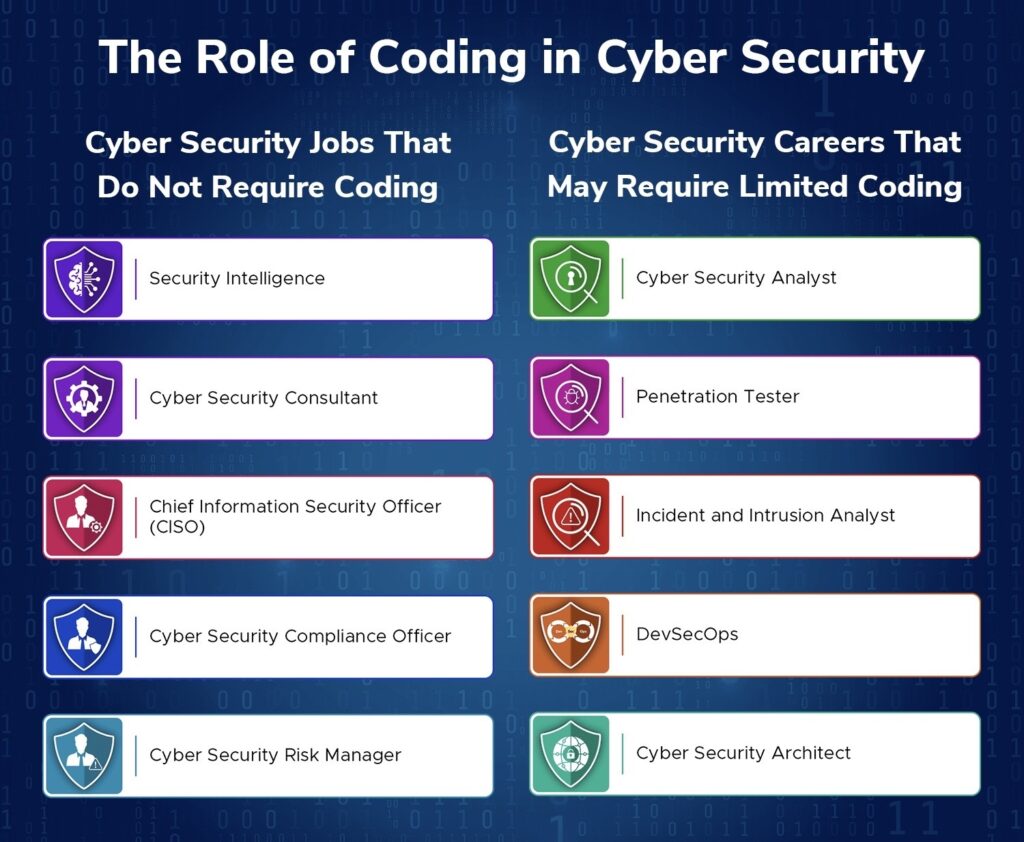
The field of cybersecurity is vast, encompassing numerous specializations. Each role benefits from proficiency in specific programming languages. Here’s a breakdown of common cybersecurity roles and the best programming languages for each:
1. Penetration Tester
Penetration testers (pentesters) simulate cyberattacks to identify vulnerabilities:
- Python: Used for writing custom scripts and tools for network and system testing.
- SQL: Essential for detecting and exploiting database vulnerabilities through SQL injection.
- JavaScript: Critical for testing web application security, especially against XSS attacks.
2. Malware Analyst
Malware analysts dissect malicious software to understand its behavior and develop countermeasures:
- C and C++: Crucial for analyzing low-level malware that interacts directly with system resources.
- Python: Used to automate the analysis of malicious code and scripts.
- Assembly: Provides insight into how malware operates at the hardware or firmware level.
3. Security Engineer
Security engineers design and implement systems to protect organizations from cyber threats:
- Java: Commonly used in enterprise-level security applications.
- Python: Preferred for scripting and automating security tools.
- C: Used for developing low-level security solutions, such as firewalls and intrusion detection systems.
4. Incident Responder
Incident responders handle security breaches and mitigate their impact:
- Python: Used for automating response actions, such as isolating affected systems.
- PowerShell/Bash: Essential for writing scripts to investigate and respond to incidents on Windows and Linux systems.
- SQL: Helps analyze database logs for signs of intrusion.
5. Cryptographer
Cryptographers design secure encryption algorithms and protect sensitive data:
- Python: Supports libraries like PyCrypto for cryptographic operations.
- C++: Used in implementing efficient cryptographic protocols.
- Java: Common in developing secure communication systems and enterprise applications.
6. Ethical Hacker
Ethical hackers, or white-hat hackers, test systems to identify vulnerabilities before malicious hackers can exploit them:
- Python: Used extensively for writing hacking scripts and tools.
- JavaScript: Enables testing of web application security.
- Ruby: Sometimes employed for scripting exploits and working with frameworks like Metasploit.
7. Security Architect
Security architects create and maintain the overall security structure of an organization:
- Java: Important for developing and testing secure systems.
- Python: Ideal for integrating various security solutions into a cohesive framework.
- C and C++: Useful for understanding system-level operations and vulnerabilities.
YOU MAY ALSO LIKE: Cybersecurity Jobs: A Comprehensive Guide for Aspiring Professionals
Cybersecurity Coding Salary Insights
The programming languages you master can significantly impact your earning potential in cybersecurity:
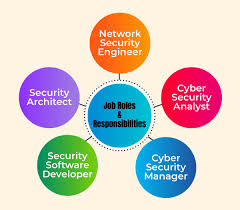
- Python Developers: Often command some of the highest salaries in the field due to its versatility.
- SQL Specialists: Those skilled in database security can expect competitive salaries given the importance of protecting data.
- Java Professionals: Proficiency in Java can lead to lucrative roles, especially in enterprise cybersecurity.
Understanding the demands of each role helps you tailor your learning journey and maximize your value in the cybersecurity job market.
Cybersecurity Coding Examples: Real-World Applications of Programming
Programming languages are the backbone of cybersecurity solutions, enabling professionals to detect, analyze, and prevent cyber threats. Let’s explore some real-world examples of how coding plays a pivotal role in this field:
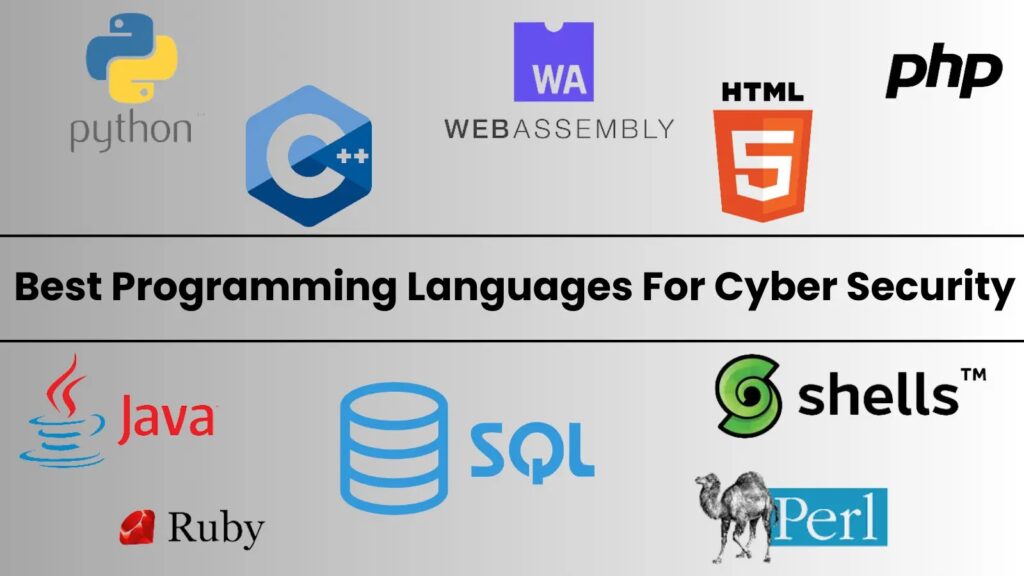
1. Detecting Network Intrusions
Python Example: Writing a script to detect anomalies in network traffic.
import scapy.all as scapy
def sniff_packets(interface):
scapy.sniff(iface=interface, store=False, prn=analyze_packet)
def analyze_packet(packet):
if packet.haslayer(scapy.IP):
print(f”Source: {packet[scapy.IP].src}, Destination: {packet[scapy.IP].dst}”)
sniff_packets(“eth0”)
- This script monitors packets on a network interface, a foundational step in detecting malicious activity.
2. Securing Databases Against SQL Injection
SQL Example: Analyzing queries for vulnerabilities
SELECT * FROM users WHERE username = ? AND password = ?;
- Secure coding practices ensure placeholders are used to prevent attackers from injecting malicious SQL code.
3. Automating Incident Response
Bash Example: Isolating a compromised system.
Script to block an IP address on Linux firewall
BLOCK_IP=”192.168.1.10″
iptables -A INPUT -s $BLOCK_IP -j DROP
- Incident responders often automate such tasks to quickly neutralize threats.
4. Penetration Testing Web Applications
JavaScript Example: Testing for Cross-Site Scripting (XSS).
<script>alert(‘Testing for XSS vulnerability’);</script>
- Ethical hackers inject harmless scripts to identify vulnerabilities and help secure web applications.
5. Reverse Engineering Malware
Assembly Example: Dissecting malware behavior.
section .text
global _start
_start:
mov eax, 1
int 0x80
- Assembly code analysis helps malware analysts understand low-level operations and design countermeasures.
6. Building Secure Communication Systems
Java Example: Encrypting data transmissions.
import javax.crypto.Cipher;
import javax.crypto.KeyGenerator;
import javax.crypto.SecretKey;
public class EncryptData {
public static void main(String[] args) throws Exception {
KeyGenerator keyGen = KeyGenerator.getInstance(“AES”);
SecretKey secretKey = keyGen.generateKey();
Cipher cipher = Cipher.getInstance("AES");
cipher.init(Cipher.ENCRYPT_MODE, secretKey);
byte[] encryptedData = cipher.doFinal("SecureData".getBytes());
System.out.println(new String(encryptedData));
}}
- Java’s robust cryptographic libraries make it a popular choice for implementing secure systems.
7. Vulnerability Scanning Tools
Ruby Example: Automating vulnerability scans with Metasploit.
use exploit/windows/smb/ms17_010_eternalblue
set RHOSTS 192.168.1.100
run
- Ruby’s compatibility with tools like Metasploit allows cybersecurity experts to test systems for known vulnerabilities effectively.
These examples underscore how mastering programming enables cybersecurity professionals to solve complex challenges and safeguard critical systems.
Do I Need to Learn Programming for Cybersecurity?
One of the most common questions for aspiring cybersecurity professionals is: Do I need to learn programming for cybersecurity? While the answer depends on your career goals within the field, having a foundational understanding of programming is increasingly becoming a necessity rather than an option.
Why Programming Skills Are Essential in Cybersecurity
- Understanding System Vulnerabilities
- Many cybersecurity threats stem from software vulnerabilities. Without a basic grasp of how programs work, it’s difficult to identify, exploit, or patch these vulnerabilities effectively. For example, understanding SQL helps detect and mitigate injection attacks on databases.
- Customizing Security Solutions
- Not every organization faces the same threats. Knowing how to write or modify scripts in languages like Python enables professionals to tailor security tools to specific needs.
- Incident Response and Forensics
- Programming helps automate tasks such as isolating compromised systems or analyzing malware. It also enables forensic experts to write tools for data recovery and analysis during investigations.
- Ethical Hacking and Penetration Testing
- Ethical hackers rely on programming to write exploits, automate reconnaissance, and simulate attacks. Without coding skills, these tasks become nearly impossible.
- Securing Future Career Growth
- As cyber threats grow more sophisticated, so does the demand for technical expertise. Employers often prioritize candidates with programming knowledge, reflecting in higher salaries and better opportunities.
Cybersecurity Roles Where Programming Is Crucial
- Penetration Tester: Writing custom exploits and testing vulnerabilities.
- Security Analyst: Automating tasks such as log analysis.
- Malware Analyst: Reverse engineering malicious code.
- Security Engineer: Developing secure systems and applications.
When Programming May Be Less Critical
Certain roles, such as governance, risk, and compliance (GRC), or IT auditing, may not require deep programming expertise. These positions focus more on policies, frameworks, and strategic planning rather than technical implementations.
Learning Programming
The good news is that you don’t need to become a full-stack developer overnight. Start with languages like Python, known for its simplicity, and gradually explore other languages based on your interests and career path.
While you can enter cybersecurity without programming skills, your growth and effectiveness in technical roles will likely be limited. For those aspiring to become ethical hackers, malware analysts, or penetration testers, programming is indispensable.
Why Learn Programming for Cybersecurity?
As cyber threats evolve, understanding programming equips security professionals to adapt quickly, automate responses, and innovate protective measures. Platforms like Reddit often discuss topics such as “Do I need to learn programming for cybersecurity?” and consistently emphasize its importance. Not only does programming enhance problem-solving, but it also improves the understanding of how systems operate, which is essential for identifying weaknesses.
A Career with Growing Demand
Cybersecurity professionals skilled in programming can expect attractive compensation, with specialized roles offering competitive salaries. As the demand for expertise rises, understanding languages like Python, JavaScript, and SQL is increasingly rewarding. For those exploring the topic on Reddit—whether asking “What coding language is best for cybersecurity in 2024?” or browsing discussions on “cybersecurity coding salary”—the consensus remains clear: mastering programming is non-negotiable.
SEE MORE LIKE THIS: Is Cybersecurity Hard to Learn? A Complete Analysis
Final Thoughts
While there isn’t a one-size-fits-all answer to the best coding language for cybersecurity, acquiring a strong foundation in multiple languages is key. Aspiring professionals should start with high-impact languages like Python and gradually expand into more specialized areas. Additionally, investing in certifications, hands-on experience, and contributing to open-source projects can elevate one’s expertise and credibility in the field.
Cybersecurity is a fast-evolving discipline, and programming is the backbone that keeps professionals ahead of threats. With dedication and continuous learning, anyone can build a successful and impactful career in this exciting domain.
FAQs: Cybersecurity and Programming Languages
What programming languages are best for cybersecurity?
The best programming languages for cybersecurity depend on the specific tasks and areas of focus. Here are some key recommendations:
- Python: Ideal for automation, scripting, malware analysis, and penetration testing. Its simplicity makes it great for beginners.
- C and C++: Essential for low-level system manipulation, exploit development, and reverse engineering.
- JavaScript: Crucial for web security, detecting vulnerabilities, and defending against cross-site scripting (XSS) and injection attacks.
- SQL: Necessary for database security and understanding SQL injection attacks.
- Java: Widely used for building secure enterprise applications and Android security.
- Assembly: Vital for advanced reverse engineering and malware development.
Each language serves a unique role in the diverse field of cybersecurity.
Is Python or C++ better for cybersecurity?
Both Python and C++ have unique strengths:
- Python:
- Easier to learn, with a vast array of libraries for automation and penetration testing (e.g., Scapy, Nmap).
- Ideal for rapid prototyping and scripting tasks.
- Best suited for high-level tasks like malware analysis and network scanning.
- C++:
- Offers low-level control over hardware and system resources.
- Essential for writing exploits, rootkits, and manipulating operating systems.
- More complex to learn but critical for advanced cybersecurity tasks.
For beginners and general cybersecurity tasks, Python is better. For advanced professionals and those focusing on reverse engineering or exploit writing, C++ is indispensable.
What type of coding is needed for cybersecurity?
Cybersecurity requires various types of coding depending on the task:
- Scripting: Used for automation, penetration testing, and rapid problem-solving (e.g., Python, Bash).
- Low-Level Programming: Needed for understanding and manipulating operating systems, as well as reverse engineering (e.g., C, Assembly).
- Web Development: Vital for securing or exploiting web applications (e.g., JavaScript, PHP, HTML).
- Database Management: Required for database security and preventing SQL injection attacks (e.g., SQL).
Cybersecurity professionals should be versatile, combining scripting, system-level, and web programming skills to handle diverse challenges.
What is the first programming language to learn for cybersecurity?
For beginners entering cybersecurity, Python is the best first language to learn because:
- It has a beginner-friendly syntax, making it easy to understand.
- Python offers extensive libraries and frameworks for cybersecurity tasks like penetration testing and malware analysis.
- It is highly versatile, allowing you to experiment with various cybersecurity domains like networking, web security, and scripting.
Once comfortable with Python, expanding to other languages like C, JavaScript, and SQL will build a more comprehensive skill set for advanced roles.
Transform your career with ExcelMindCyber’s roadmap to six-figure success in cybersecurity. Our program delivers essential guidance and strategies to help you master the skills and secure the roles that matter. Start today and take the first step towards transforming your career!
